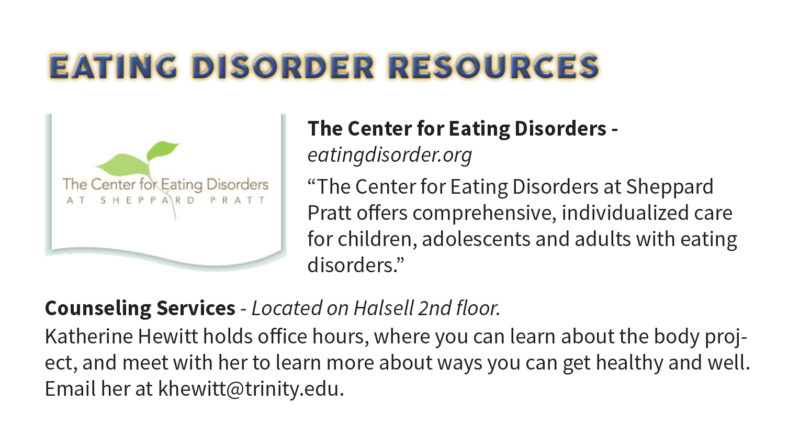The bombardment of messaging from the weight gain and loss industry is unyielding. There is the paleo diet, South Beach diet, low-carb diet, high-protein diet, juice fasts and even a cookie diet. Superfoods like kale, quinoa and chia before that; bulk-up powders and sugary protein shakes “¦ so what should we choose? My vote is: none of the above. Fad diets are just about one of the worst things you can do to sabotage your wellness.
I truly believe that diets can lead to eating disorders. Katherine Hewitt, Trinity’s on-campus health and wellness expert, agrees.
“Frequent dieting, fasting and extreme calorie counting are several examples of disordered eating,” Hewitt said.
Based on a study by the Philadelphia Eating Disorder Examiner, as many as 25 percent of occasional dieters advance to full-blown eating disorders.
“Remember, there are other eating disorders besides anorexia, such as binge-eating disorder, bulimia and more recent terms include avoidant/restrictive food intake disorder (ARFID) and other specified feeding and eating disorders (OSFED),” Hewitt said.
Eating disorders such as these affect over 10 million people in the United States according to the Center for Eating Disorders, and that number is growing every year. When we overanalyze how we eat, it can become an unhealthy obsession.
“I think health recommendations change so frequently, that it is hard to just pick one weight-loss option or solution,” Hewitt said.
To prove my point, it seems like every week we are told to eat a new item or substitute. Almond milk anyone?
Nina Teicholz, an investigative journalist, wrote a book called “The Big Fat Surprise” which argues for the inclusion of saturated fats in a healthy diet. What?! I thought avoiding fats was the one thing I could count on. But it doesn’t end there: avoid salt “” no, actually, that’s not so bad for you. Don’t eat fast food “” but some woman in Florida lost 54 pounds eating nothing but Taco Bell for a month. What are we supposed to make of all of these conflicting messages?
Hewitt recommends getting back to basics.
“Fresh is best,” Hewitt said. “Eat breakfast, evenly space your meals, limit or avoid salt, sugar, fat when possible and stick with lean protein and tons of veggies.”
I like this middle-of-the-road approach much better than the crazy elimination diets that I’ve tried in the past. Hewitt takes a holistic approach using eight different dimensions of wellness, not limited to just diet and exercise; it includes a spiritual dimension, getting enough sleep and managing stress. I encourage students to find her in her office hours in Halsell on North Campus if they’re interested in learning more.
Why are we so obsessed with attaining a body image that is fundamentally so unrealistic? Carolyn Becker, professor of psychology, was a leader in a collaborative effort to create a program to combat the pressures of society called the Body Project. Now used in over 140 universities, this program runs every year at Trinity to help students cope with the appearance ideal.
“Barbie and Ken set us up to fail!” Hewitt said.
She’s worried about social media platforms as well, as it is easy to consume the messages of the appearance ideal. Instead, she recommends using social media to connect with others and find out about local activities, like FitCitySA.
I, personally, will continue to partake in the Tomorrow Diet and forget about the fads.




